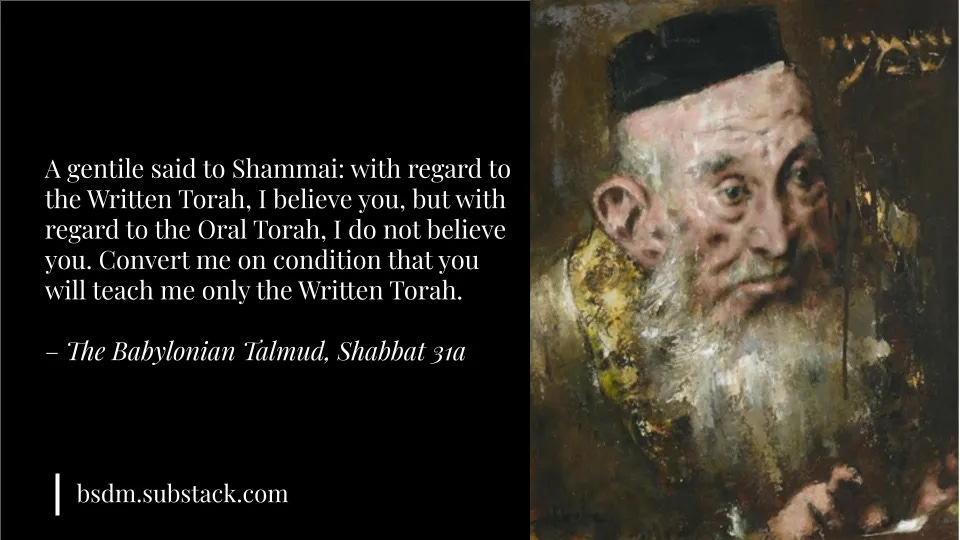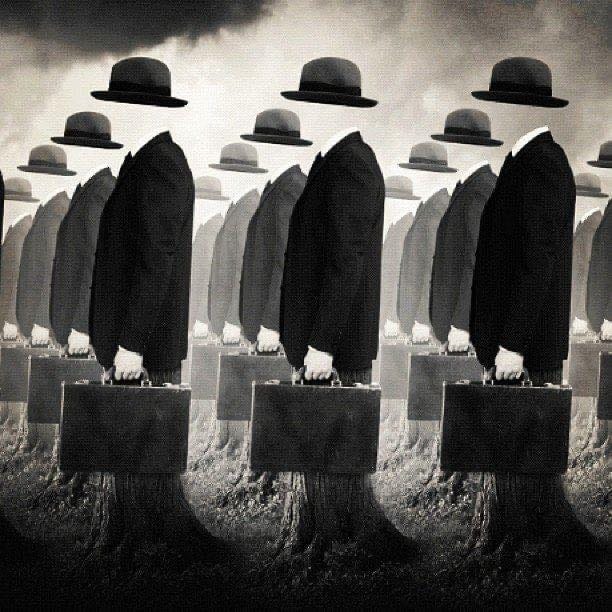Background
In Start a Substack!, M2D pointed to:
Normalized theft of attention as a feature of our kleptocratic economic order.
Substack as a path to recovery from exposure to a media ecology more polluted than our physical environment.
Advertising as a toxin in our media that perpetuates the kleptocratic allocation of human attention.
Loss of freedom through covert censorship as one of the consequences of our refusal, in McLuhan's words, to “contemplate what is happening”.
In this brief Introduction to Kosher Media, our colleagues at BS"D put a Jewish spin on the distinction between kleptocratic and non-kleptocratic media. Kleptocracy is neither kosher nor cool, they argue. By contrast, non-kleptocratic kosher media environments are sanctuaries in which attention is only earned or gifted.
We must protect these tabernacles from the corrupting influences I sketched out in What is Dialogue. To this end, we must be willing to exclude a certain character type that BS"D describes as “immune to language”. To help readers overcome any resistance to this recommendation, BS"D even “channeled” Beit Shammai, a Talmudic sage, and then illustrated immunity to language with these three lines of an imagined dialogue:
“Your sister is a whore.
“But I don't have a sister.”
“That's OK. Your sister is a whore.”
This character type has no place in tabernacles for Becoming Fully Human. To see why, we return to Beit Shammai below. As usual, if this inquiry interests you, subscribe.
Kosher Media: The Anti-Kleptocracy
Sometimes, we protect tabernacles by excluding those who would dare desecrate God's dwelling place. That’s why, for this post, I called upon the spirit of Beit Shammai in Shabbat 31a to help me and my subscribers cleanse our sanctuaries. Here's the fuller passage from Sefaria:
The Sages taught; There was an incident involving one gentile who came before Shammai. The gentile said to Shammai: How many Torahs do you have? He said to him: Two, the Written Torah and the Oral Torah. The gentile said to him: With regard to the Written Torah, I believe you, but with regard to the Oral Torah, I do not believe you. Convert me on condition that you will teach me only the Written Torah. Shammai scolded him and cast him out with reprimand.
The same gentile came before Hillel, who converted him and began teaching him Torah. On the first day, he showed him the letters of the alphabet and said to him: Alef, bet, gimmel, dalet. The next day he reversed the order of the letters and told him that an alef is a tav and so on. The convert said to him: But yesterday you did not tell me that. Hillel said to him: You see that it is impossible to learn what is written without relying on an oral tradition. Didn't you rely on me? Therefore, you should also rely on me with regard to the matter of the Oral Torah, and accept the interpretations that it contains.
The gentile in this story is simply uneducated, but none of what he explicitly says warrants Shammai's hostility. There's no apparent reason to assume that this person approached Beit Shammai in bad faith or with hostile intent.
Yet, Shammai doesn't limit himself to the interpretation of what the gentile says. Shammai hears something between the lines. And what he hears is enough.
Beit Shammai's priority is to maintain a kosher environment, not to protect the feelings of an impudent stranger. As protectors of our tabernacles, we can't afford to treat visitors with the presumption of innocence. We invert this peace-time default into the presumption of guilt.
The shift to the presumption of guilt happens naturally for at least two related reasons. First, the victims of attention theft stop denying the reality and gravity of the crime. Second, the perpetrators of the crime stop pretending that they give a damn about the consequences of their actions; they become shameless.
The victims’ diminishing inclination to denial and the perpetrators’ increasing shamelessness combine to invert the presumption of innocence. Once we stop denying what the desecrators of our sanctuaries increasingly proclaim with pride, we deem them guilty until proven innocent.
The thieves are now open about their desire to destroy what sustains us. Precisely because we finally believe them, we must respond to them in the spirit of Beit Shammai’s response to the gentile in Shabbat 31a.
Kashrut: A Matter of Life and Death
This is the second in a series of posts in which I “define my product”. Kashrut (Jewish dietary law) is at the heart of the definition even though my product isn’t edible — only dialogically consumable. As a metaphor for the distinction between kleptocratic and non-kleptocratic media, kashrut works because the distinction is a matter of life and death.
This much should be clear from the first installment in this series — Becoming Fully Human: An Introduction to Dialogue as a Service (DaaS). There, I shared hightlights of what I had written in 2023 about both the salvific potential and destructive pitfalls of dialogue. In this post, however, my main point is that dialogue only works in kosher environments that recognize theft of attention as a form of assault.
The maintenance of kosher media requires a cultivated discernment through which we distinguish the kosher from the treyf. Or, in non-dietary terms, we decide whom to invite into our tabernacles and whom to exclude or expel.
Indeed, the long journey to the Promised Land doesn’t unfold one step at a time, but rather one exclusion at a time. Media kashrut also requires an uncompromised readiness to take unpopular or even hurtful action in self-defense. Through discernment, we distinguish the kosher from the treyf; with readiness, we exclude the treyf from our diet.
There’s no need for debate here. It’s a matter of life and death and a daily choice in the fight against the theft of our lifeblood.
Theft of Mind
I appreciate the provocation from
that inspired this post. In return, I'd like to further explore the kleptocracy of the attention economy as an example of the “theft of mind” forbidden by Jewish laws against Gneivat da'at (GD).According to one midrash, GD is the worst type of theft because it doesn't just take the victim's money; it's a type of abuse that robs the entire person. As a category, GD is broad, encompassing a variety of deceptive behaviors that remain a feature of economic life even since before Shammai. For example:
Inviting a guest to dinner just to appear hospitable, knowing that the guest will have to decline due to a prior commitment.
Using a pretext to attract a prospective customer’s attention to make a sale.
Advertising a discount while charging the full price.
Advertising a going-out-of-business sale without going out of business.
Advertising a luxury item as a necessity.
Using misleading product packaging.
Depending on the form and context, these ‘thefts of mind’ may be legal or illegal, mild or severe. But regardless of form or context, these thefts are not only wrong but also yucky.
I greatly value the wisdom of Talmudic sages, but I doubt any legal system in history or in modern day has adequately accounted for — or provided a defense against — ‘theft of mind’ as a civilizational threat.
For protection from this pandemic, we can't look to government, business or ideology. We can't seek shelter in existing or proposed laws or regulations. We can only look to each other as we explore the potential and pitfalls of dialogue and the tricky architecture of tabernacles.
Can You See the Emperor's Nudity?
On the heels of his 1964 work ‘Understanding Media: The Extensions of Man’, Marshall McLuhan wrote an essay entitled ‘The Relation of Environment to Anti-Environment. In the excerpt below shared by Andrew McLuhan, these two sentences stood out to me:
“When the Emperor appeared in his new clothes, his courtiers did not see his nudity, they saw his old clothes. Only the small child and the artist have that immediacy of approach that permits perception of the environment.”
If you see the Emperor's schmeckel flippin’ and floppin’, I'd love to see you on my list of subscribers.
Bonus Content
Image of the Day
Word of the Day
Anagnorisis - The moment of insight when the protagonist recognizes or discovers his own or another character's identity or predicament, leading to the resolution of the plot.
Quote of the Day
“I am no doubt not the only one who writes in order to have no face. Do not ask who I am, and do not ask me to remain the same: leave it to our bureaucrats and our police to see that our papers are in order. At least spare us their morality when we write.”
— Michel Foulcault (Introduction to The Archeology of Knowledge)
Video of the Day
Substack Post of the Day
More to come on digital anthropology.
Thought of the Day
It's wrong to pathologize dissent, but it's equally wrong to conflate dissent with epistemic power grabs, which tend to be as psychopathic as any other kind.








